As anyone who’s read this blog for any time will have noticed, my updates took rather a dip in the second half of the year. That was due to my change of job, and indeed change of career. Happily I’ve not had any health issues or life crises.
Still, while I tend to have more predictable hours in the Civil Service, those hours I do have tend to be fairly densely packed which gives less downtime than I used to have. I’ll give some thought as to what that means for updates, but I doubt reviewing every book I read will be realistic any more.
Anyway, enough about the future, what about the past? Here, without further ado and in no particular order, are my books of 2018:
Best Western that’s not a hotel chain: Paulette Jiles’ News of the World.
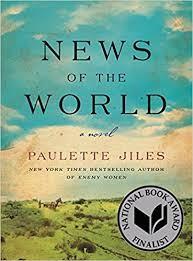
I wrote this up way back in March and it’s stayed with me. I don’t read much fiction set in the Old West (though I do love Westerns). This somehow captures the sweep of the genre, but in a surprisingly slim volume. Despite it’s brevity it still packs in character growth, exciting set pieces and a lovely sense of the frontier. Really surprisingly good, and it’s held up very well in memory.
Best novel about a Bollywood-inspired computer virus: Transmission, by Hari Kunzru
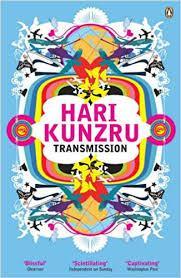
This was Kunzru’s second novel and, as far as I understand, quite a disappointment to those who loved his first and wanted more like it. I’ve never read his first so can’t compare, but this certainly wasn’t a disappointment for me. I wrote it up here.
It is a bit slighter than some of the later Kunzru’s I’ve read, but I thoroughly enjoyed this tale of disparate lives brought together by a computer virus and a lonely geek’s love of a beautiful Bollywood film star.
It’s very Gibsonian, which I noted in my review comparing it to Gibson’s Pattern Recognition of a year earlier. They both capture something of their moment, but in Kunzru’s case with a definite sense of fun and with a certain romance to it all.
Best opening paragraph: The Haunting of Hill House, by Shirley Jackson
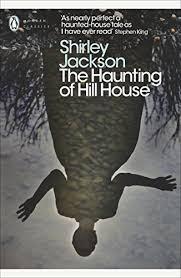
NO LIVE organism can continue for long to exist sanely under conditions of absolute reality; even larks and katydids are supposed, by some, to dream. Hill House, not sane, stood by itself against its hills, holding darkness within; it had stood so for eighty years and might stand for eighty more. Within, walls continued upright, bricks met neatly, floors were firm, and doors were sensibly shut; silence lay steadily against the wood and stone of Hill House, and whatever walked there, walked alone.
I really don’t think I need to say more than that quote. Just superb. The rest of the book’s pretty good too… Here‘s my full review.
Best novel with hidden depths: Ghachar Ghochar, by Vivek Shanbagh
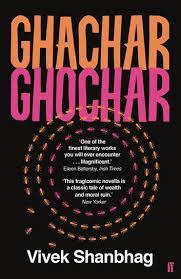
(No full review of this one, but I wrote some thoughts in a monthly roundup here).
This seemed a bit slight when I read it. Slight even. It’s stayed with me though. I can remember the characters, the story such as it is, even some of the writing. It’s a lovely little tale of corruption and choices we may not notice ourselves making but are no less irrevocable for all that. This was actually a fair contender for my novel of the year just because it’s been such a stayer in memory.
Best SF/crime genre crossover: The City and the City, by China Miéville
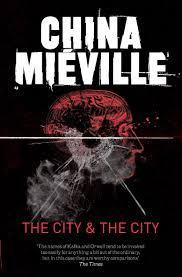
Slightly reductive title there, as this is rather it’s own thing and arguably contains no SF elements other than the sense of strangeness and the other which is central to SF. I wrote a bit about it in my May writeup, here.
For those not familiar with it, it’s a crime novel of sorts, but set in a pair of spatially coterminous cities. As a matter of culture, tradition and strictly enforced law the inhabitants of each city must choose not to see the other, not to hear its sounds or take any part in its life. It’s a rule that’s threatened when a murder happens and it’s unclear which city the corpse is in.
What follows is both a murder inquiry and a sort of conspiracy thriller, but where there may be no conspiracy. It’s a comment on the Balkans in part, but also on everywhere where the citizenry are told what to believe, and believe the absurd because it’s safer than seeing the reality around them. It’s a novel about divisions of ethnicity, class, and all those barriers we erect which are all the more powerful for not being actually physically real.
It’s a high concept novel, but Miéville is a high concept writer so no surprise there. I loved the concept, and more importantly I loved how Miéville pulled all this off within the structure of a fairly standard crime novel (particularly the early chapters which are almost, but clearly intentionally, clichéd).
Best description of home decor in a novel: Care of Wooden Floors, by Will Wiles
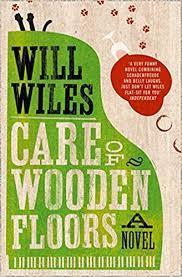
This was also in my May writeup, but I then managed to get back to it and do a full post here. It’s held up well in memory, particularly for the skill with which Wiles captures space and light but also for the underlying humor and humanity of it – how our fallibility compromises, perhaps for the better, our dreams of perfection.
It does have far too many similes, as I note in my original review, and it almost got bumped from this list for that. Still, better a good novel with faults than a consistently average one.
Novel with the most surprising staying power: A Quiet Place, by Seichi Matsumoto and translated by Louise Heal Kawai
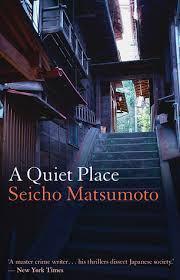
Wow but May was a good month. This is in my May writeup too, and came closest to being bumped from this list (in fact, I initially cut it on my first pass over my list of books I’d read this year).
The reason this made it on to the list was that it suddenly occurred to me that nearly seven months later I can still remember pretty much all of it. I remember the characters, key scenes, the mood even. That’s impressive.
So, I can’t really say why it deserves a place on my list. It’s not the best thriller I read in the year, I liked it rather than loved it when I initially read it, but here it is still just as clear as the day after I finished it. I think that deserves some recognition, and speaks of some talent too.
Most expensive book of the year: The Great Fortune, by Olivia Manning
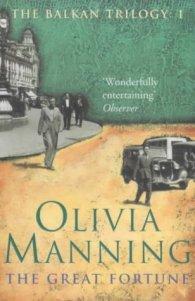
Most expensive in the sense that I started it in Kindle, but liked it so much I went out and bought all six volumes of the sequence it’s part of in hardcopy.
I wrote about this at length here, and I’ve not much more to say in this post. The descriptions of a city under siege, and of a marriage equally under siege, were superb. I plan to return to Manning fairly early on in the New Year. Another contender for book of the year.
Best novel about goats: Goat Days, by Benyamin and translated by Joseph Koyippally
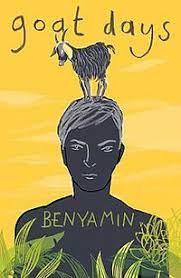
Translated from the Malayalam no less, a language I didn’t even know the name of before reading this (which is a comment on the limits of my education rather than the language).I didn’t write it up and sadly I’ve lost the post which originally alerted me to it.
Goat Days is a novel about the treatment of migrant workers in the Gulf. Najeeb travels there from India hoping to make money to send home to his family. Instead he finds himself effectively enslaved on a remote goat farm. His only human company is the vicious overseer who is barely better off than he is, and of course the goats. It is a life of utter privation and misery with no easy prospect of escape.
It sounds horribly bleak, and the situation is, but it’s written in hindsight so we know Najeeb somehow does escape, though as the book opens he’s so desperate he’s trying to get himself arrested in the hope of being fed and deported. Najeeb’s humanity shines through though, as does his resourcefulness and his memories of his home. I found it a surprisingly light read for such a dark subject, a clever mixture of comedy and existentialism, and if you’ve not heard of it I’d suggest it’s at least worth taking a look at if you can find a copy.
Best romantic fiction with an SFnal twist: Exit West, by Mohsin Hamid
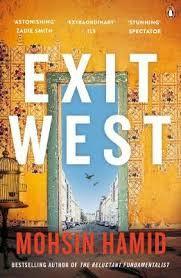
So by this point it’s fairly clear I’m a big fan of Hamid’s work. Exit West is his 2017 novel partly about the refugee crisis but also about a love story between two fairly ordinary teenagers.
It opens in an unnamed city, likely in Pakistan though not necessarily so (it’s not the first time Hamid’s used that device). Saeed, a good natured and religious young man, falls in love with an intelligent and independent young woman Nadia and she with him.
Militant forces are encroaching on the city, so their love takes place in a time of impending (if local) apocalypse). They have dates, arguments, conversations deep into the night; meanwhile the bombings and news of atrocities gets ever closer.
However, there is one wrinkle. Doorways are appearing across the world. Enter one and you come out somewhere else (the mechanics of this is never explained and isn’t remotely the focus of the story). That magical device means that people trapped as Saeed and Nadia are have the possibility if they can find the right door of stepping right across the world into a better life.
The decision to leave your home, even in the face of war, is difficult and you’ll be leaving behind everything you know for who know’s what? Reactions to these unasked for migrants are mixed, some compassionate, many hostile. The doors allow Hamid to ignore the logistics of emigration and instead focus on the experience. In the midst of all of this he paints a tender and persuasive love story, often unexpected and often touching too.
I loved it, and it was also one of the clear front-runners for my book of the year.
Best novel featuring overly precocious children: The Beginning of Spring, by Penelope Fitzgerald
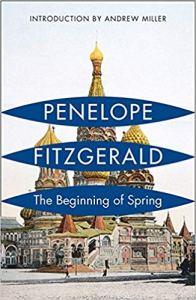
Well, who but Fitzgerald could ever win the price for best novel featuring overly precocious children? The Beginning of Spring is Fitzgerald’s marvelous novel about an Englishman in Moscow in 1913 who is abandoned by his wife for no obvious reason and left to raise their children as best he can.
It’s funny, the description above is accurate, but it captures nothing of the book. It’s an elusive book (to borrow a description JacquiWine used of it) and it’s protagonist is notable mostly for his utter lack of understanding of himself and everyone around him. It’s a book in which more is left unsaid than is ever said, and perhaps a novel too of unbridgeable distances and miscommunications.
There’s a full review of it by JacquiWine here, and a less positive review by Kaggsy here. Simon Lavery also wrote rather well about it here. Lastly, Sam Jordison wrote a rather good piece about it in the Guardian here.
And that takes me to, drumroll please:
My best book of the year 2018: Flights, by Olga Tokarczuk and translated by Jennifer Croft
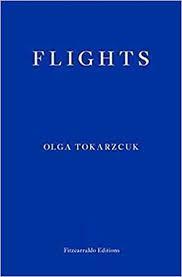
It’s not ideal that I didn’t write at all about what’s turned out to be my favorite book of the year, but there you go. Fortunately, Tony of Tony’s Reading List did the honours here.
It’s not an easy book to describe, as there’s no plot as such and no clear connective tissue. Instead there’s a series of vignettes, some returned to, some not about matters as disparate as a man who loses his wife and child on a tiny island while on holiday; an unnamed traveler (possibly the narrator) passing through airports and constantly in transit; the real life story of Angelo Soliman, an African-born Austrian Freemason and courtier of the 18th Century who on his death had his body mounted and stuffed by his friend the Austrian Emperor and displayed as an example of a savage.
There’s much more than that though. As you read it themes emerge, about travel and about the body itself, the irreducibility of the physical self however much we hurl it about the planet. Stories are left hanging unresolved, sometimes returned to, sometimes not. You have to construct your own narrative from it, but Tokarczuk holds your hand as you do so.
I read it, appropriately enough, while traveling. I read it on planes and in Rome and Marrakech. I think that helped. It’s a book which merits a little transience on the reader’s part.
And that’s it! Hopefully some of what’s above was of interest, and apologies to all the highly deserving books which didn’t make the list but which might have on another day.
Happy New Year, one and all!
